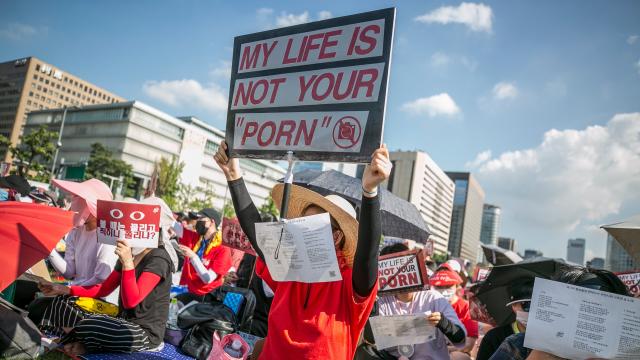Thousands of women in South Korea have protested spycam porn in the region — in which obscured cameras are installed to nonconsensually record women in intimate places — and now police are asking people to put camera protectors on their phones.
The Gyeonggi Bukbu Provincial Police Agency has created almost 50,000 camera protectors and are distributing the free covers in response to an increase in spycam porn-related crimes, according to a report from Korea Herald. This is part of its “Illegal Filming OFF” campaign.
The police in northern Gyeonggi Province reportedly said this campaign included input from the agency’s communications department, its women and youth division, and some people in the marketing industry.
“Reactions have been mixed, but we have also had positive reactions as the campaign is designed to prevent misunderstandings in public spaces,” a spokesperson for the police department said, according to Korea Herald.
This isn’t the first time government officials have stepped in to help grapple with the troublingly rampant issue. In August, South Korea’s government announced that public transportation sites are now required to have dedicated teams tasked with seeking out hidden cameras. This includes public restrooms, which will be characterised as a “clean zone” if they are inspected regularly and “for a significant amount of time”. Hubs that don’t oblige this relatively new regulation can be fined.
The government also announced that it would put up posters in nearly 1000 women’s and children’s rights organisations as well as 254 police stations to inform the public that it’s illegal to nonconsensually record someone and share the video online.
Awareness campaigns such as adhesive camera covers and posters are certainly good measures to educate people on the seriousness and illicitness of the issue — but they shouldn’t be purported as solutions.
As the thousands of women demanded during spycam protests in the country, the primary issues include the government’s failure to prosecute men who nonconsensually record and share these videos online as well as, more broadly, gender-discriminatory investigations.
And while the camera covers will likely raise some awareness, they may distract from the fact that most of the nonconsensual videos aren’t filmed by passersby on their phone; they are hidden in spaces such as buses, taxis, pools, supermarkets and restrooms, with some perpetrators going so far as to install them in men’s shoes and bathroom stall screws.
